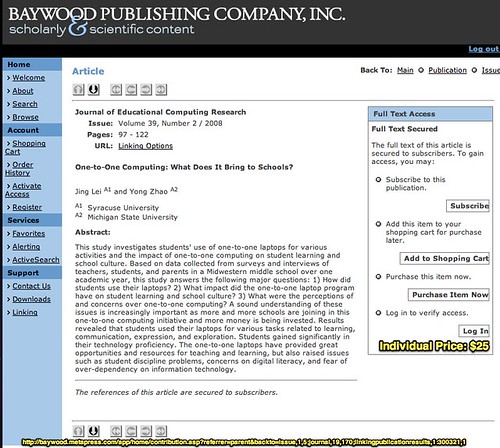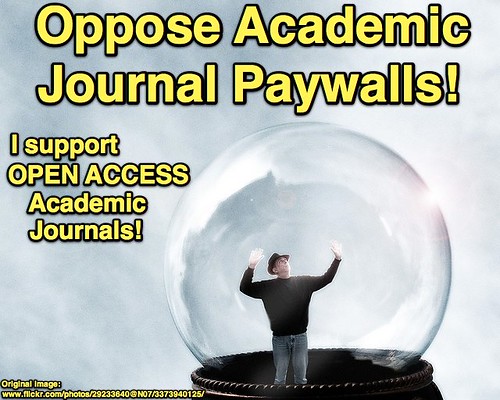Academic journals should not have paywalls. Academic publishing is done for many reasons, but high among those should be the desire to share ideas in the “commons” of information so others can both learn from and build on those ideas. Forcing others to PAY to simply read your ideas when they are formally published in an academic journal is antithetical to the basic ideals of academic publishing. Unfortunately, we see a number of professional organizations as well as journal publishers ignoring or rejecting this ethic of open sharing and publishing. In his book “Being Digital,” Nicholas Negroponte explains how transformative it is to convert atoms to bits. The marginal cost of sharing bits online is zero. In “Free: The Future of a Radical Price,” Chris Anderson explains not only why many information services today are free, but also why many SHOULD be free. There are times and places for creating artificial scarcity for intellectual property works and charging an access fee. Academic journal publishing should NOT be one of those exceptions to the tendency for bits to be free, however.
The following is an example of an article I wanted to read this past week, but I didn’t because I was unwilling to pay $25 (a ridiculously high fee) to read it.
The Journal of Virtual Worlds Research is an example of an open-access, peer-reviewed journal which does NOT have a paywall of any type. Anyone can view published articles there for free. We need ALL our academic journals to embrace this paradigm of free, electronic publication. Perhaps we need a campaign with website badges which professors can utilize to evangelize this perspective on publishing?
Hat tip to John Lester of Reaction Grid for sharing the Journal of Virtual Worlds Research in last week’s Seedlings show and podcast!
Technorati Tags:
paywall, publish, journal, academic, publishing, pay, money
If you enjoyed this post and found it useful, subscribe to Wes’ free newsletter. Check out Wes’ video tutorial library, “Playing with Media.” Information about more ways to learn with Dr. Wesley Fryer are available on wesfryer.com/after.
On this day..
- Backchannel with 5th Graders & Pie Chart Questions on the Winter Olympics – 2014
- Emerging Insights on Learning, Technology, and the Road Ahead in Education – 2013
- Designing Out-of-the-Box College Course Assignments that Students Care About – 2013
- Michael Wesch on Creating Learners which Question and Live in a World of Constant Wonder – 2013
- Open Sharing Leads to eBook Inspiration: Indonesia to Minnesota to Oklahoma – 2013
- @OKCPS Executive Director Information Technology Position Open: Please Apply! – 2012
- Lessons Learned Webcasting with Ustream Producer – 2010
- Creating and Managing Digital Portfolios Using Adobe Acrobat by Allanah King – 2009
- Hooked on Learning by Pam Hook – 2009
- Join the Internet Blackout – Protest Against Guilt Upon Accusation Laws in NZ — Creative Freedom Foundation (creativefreedom.org.nz) – 2009



Comments
5 responses to “Academic journals should not have paywalls- Support Open Access Publishing!”
In most cases, what you pay for is a service, not really the paper itself. They provide a nice website (which costs money to host, design and maintain) and, via that website, they make it very easy for you to find the paper. They also have to cover administrative costs having to do with the reviewing, editing, and publishing of each paper. $25 is what they think their assistance is worth. It’s somewhat pricey but they must feel that they can get away with it.
Theses papers can often be found for free, provided that you put in a bit more effort. Use google, type in the title, try first enclosed in quotes, try without quotes if it doesn’t work. Add “filetype:pdf” at end of query.
For instance, this google search: http://lmgtfy.com/?q=%22one-to-one+computing%3A+what+does+it+bring+to+schools+filetype%3Apdf will give you access to this paper: http://www.abell.org/pubsitems/ed_onetoone_908.pdf
Paying service – Open knowledge. These two concepts are not necessarily incompatible. It’s up to the author to publish their content in an open way (if this can be done without breaching any contractual obligation).
When it comes to open publication, a website worth knowing about is citeseerx. Dedicated to giving free access to academic papers / scientific literature . You can submit your paper as an author. Or let their robots crawl the web to find out about any pdf you may have posted elsewhere
http://citeseerx.ist.psu.edu/
The way they cross link papers, based on cited references, and provide a list of related papers, based on co-citation is really clever.
Surely there has always been a situation where some academics seek to ‘sell’ their opinion/interpretation/viewpoint. When I first went to university in the late 70’s, all my lecturers used textbooks they had written as their main course material, and the cost of said texts made a huge hole in my funds (one textbook @ £30 cost more than I earned in a week in 1980). My son is currently studying for a Masters in Geophysics and paid £80 last year for a textbook written by his lecturer, without which he wouldn’t be able to complete assignments. (All the library copies were booked out well in advance…) Charging academics to read their ideas obviously has the appeal for publishers, that academics are more likely to be able to afford the cost , as opposed to students who are faced with spiralling fees etc. – or am I an old cynic?
Steve: You are right, people have always sought ways to sell their ideas / intellectual property, and I definitely don’t oppose that across the board. I’m going to publish some books myself soon, and I’m not going to give them all away. (In 1 case I will, but others I won’t.) I’m not arguing here that all textbooks should be free, although I do think as educators we should explore the viability and benefits of using models like that employed by Flat World Knowledge.
My specific focus here is academic journals, which have the ostensible goal of amplifying the new ideas of researchers which build on the findings of peers. Digital publication is a game changer: There is zero marginal cost for the publication of an additional blog post, an additional article, and additional journal entry. Academic publishing for journals needs to embrace this digital potential, and as academics we need to advocate/embrace this ethic of open publishing. Chris Anderson articulates MANY different models for organizations as well as individuals to make money in this new digital landscape in his outstanding book, “Free: The Future of a Radical Price.” Organizations like academic professional associations need to set an example for others by offering their publications in free, open journals.
We should see textbook prices fall precipitously as digital content distribution transforms and disintermediates the traditional publishing process. Flat World Knowledge is one example where this is already happening. The digital landscape won’t be entirely filled with free academic content, but it should and will be (I predict) filled with not only more choices, but also less expensive and free choices. The issue of quality amidst this sea of content / information choices will be addressed in multiple ways, but a big one will be recommendations of digital influencers like bloggers.
These are issues I feel strongly about and would like to find ways to better advocate on together with others in the years ahead.
Academic publishers need a more realistic business model. The cost to produce research is or already has been publicly financed in the vast majority of instances, and the cost of editing and publishing is minimal compared to those costs. Government needs to step in and tell journals like Nature and Science and Physical Review to shape up or ship out, and pave the way for journals which allow free access and have better business models. It is very sad and I guess it tells us that money is more important than knowledge to those folks. I understand that they need to pay their salaries and keep the journals running, but I think they also have business types working for them that are trying to reign in profits also, and that is very very sad, when they exploiting all the hard working docs and postdocs and our federal governements to make money for themselves! The journals should have grants just like everyone else or grants should have journal fees for free online publishing “mandated by law” for publicly funded research or else they have no right to publish that research. No one has a right to hold pdfs of jounnals published today by publicly funded research, and certainly no one has the right to place journal published decades ago under paywalls for profit. It is just shameful and reflects the culture of money and greed in todays world, and is a serious impediment scientific progress and work in many techical fields. I do research and am a physician, and I cannot tell you how many hours I’ve wasted trying to obtain articles or useful information to help patients or try to make good decisions in the clinic or lab.